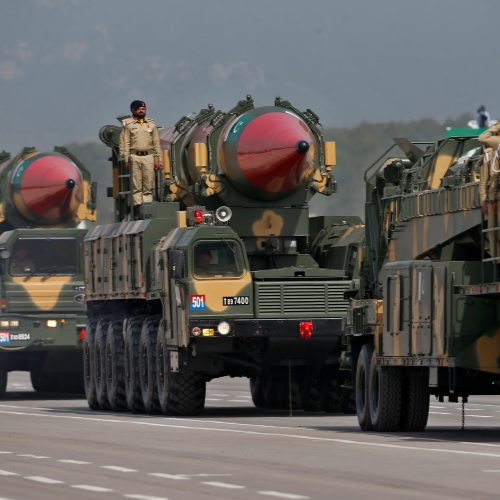In December 2024, the United States imposed sanctions on four Pakistani entities, including its state-run aerospace and defense agency. These sanctions were meant to address Pakistan’s missile development program, which the US claims is growing more sophisticated and could pose a potential threat to the United States. According to the US, these entities had been involved in acquiring materials for Pakistan’s long-range ballistic missiles, which could include missiles like the Shaheen series.
The US has been concerned about Pakistan’s increasing missile capabilities, especially since some of these missiles could potentially have a range far beyond South Asia. The US stated that this missile technology could potentially reach targets in the United States. However, many analysts believe these concerns are overstated, as Pakistan lacks the technology to launch missiles capable of reaching the US mainland. The sanctions seem to be more about showing disapproval of Pakistan’s missile and nuclear developments rather than making a significant impact on its policies.
US-Pakistan Relations: A History of Double Standards
This move by the US is part of a long history of inconsistent policies toward Pakistan. For decades, the US has supported Pakistan when it aligned with American interests, particularly during the Cold War and the War on Terror. In the 1980s, for example, the US supported Pakistan in its fight against the Soviet Union in Afghanistan, while Pakistan secretly worked on developing nuclear weapons. At the time, the US was aware of Pakistan’s nuclear ambitions but chose to overlook them for strategic reasons.
The US also remained silent when Pakistan’s nuclear scientist, A.Q. Khan, helped other countries like North Korea and Iran develop their nuclear programs. Despite knowing about this, the US only acted after the global community began to raise concerns about the spread of nuclear technology. This kind of selective focus is typical of the US’s “carrot and stick” approach to Pakistan—rewarding Pakistan when it serves US interests and punishing it when it doesn’t.
The Real Impact of Sanctions
While the US sanctions are framed as a response to Pakistan’s missile and nuclear programs, they are unlikely to stop Pakistan from continuing its missile development. In fact, Pakistan has built strong military and economic ties with China and North Korea, two countries that have supported Pakistan’s missile and nuclear ambitions. Despite multiple rounds of US sanctions against both Pakistan and Chinese companies, Pakistan has continued to develop its missile technology, often with help from China. For example, several of Pakistan’s missiles are based on or similar to Chinese designs.
US Sanctions Over Pakistan’s Missile Program is a Veiled Warning to China
Bypassing Sanctions: China’s Role
Even when the US imposes sanctions on Chinese companies for their involvement with Pakistan, it has had little effect. China simply finds ways to work around these restrictions, often through shell companies or other methods of bypassing international regulations. This shows that sanctions, while publicly seen as an attempt to control the situation, rarely change the behavior of powerful nations like China or Pakistan.
The US has used sanctions in the past as a tool to show disapproval without seriously disrupting Pakistan’s military programs. Since the 1970s, the US has imposed several rounds of sanctions on Pakistan, but these measures have had little lasting effect. In fact, Pakistan has continued to develop nuclear weapons and missile technology over the years, often with support from its allies, particularly China and North Korea. These sanctions have become more symbolic, representing the US’s public disapproval rather than a real attempt to halt Pakistan’s missile development.
The Carrot and Stick Strategy
In the past, the US has been quick to criticize Pakistan’s nuclear and missile programs when they don’t align with US interests, but it has also been willing to overlook them when Pakistan is seen as a valuable ally in the fight against terrorism or when it serves other geopolitical goals. This mixed approach has led to confusion and frustration in the international community, with some arguing that the US treats Pakistan with a “carrot and stick” strategy, offering rewards when it aligns with US interests and imposing penalties when it doesn’t.
The recent sanctions are part of a long-standing pattern in US-Pakistan relations. They demonstrate the US’s use of sanctions as a tool for expressing disapproval, but they are unlikely to significantly alter Pakistan’s nuclear or missile development. The real effect of these sanctions is more about sending a message to the international community rather than achieving concrete changes in Pakistan’s policies.


